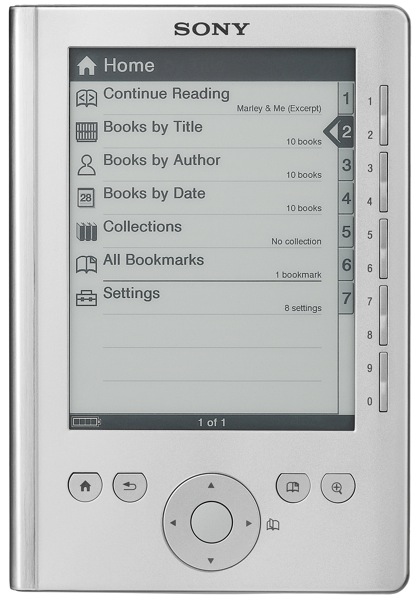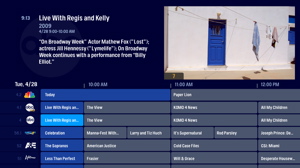
FCC begins its drive toward a National Broadband Plan
Today, the Federal Communications Commission is holding the first of more than 20 public workshops focusing on the state of broadband access in the US, which will lead up to the creation of the National Broadband Plan in February 2010.
"From this point forward, there really is no letting up," newly minted FCC Chairman Julius Genachowski said yesterday. "This will be a deeply fact-based and data-driven process. We're bringing experts in-house and reaching out to external academic partners. This will be a seriously open and participatory process. Workshops will be streamed online and allow for external participation."

Murdoch: 'We intend to charge for all our news Web sites'
In its quarterly earnings call, News Corp. reported an annual decline in revenue of $1.7 billion, citing the overall weakness of the economy as a major factor, but highlighting the advertising-related declines in its television, newspaper and information services divisions.
Rupert Murdoch, Chairman and CEO of News Corporation announced in its earnings call that the company is about to make a major change to its online news properties.

Movement to dump IE6 from the Web gets its own site
If anyone knows about the pitfalls and headaches of managing evolving platforms for downward compatibility, it's Microsoft. But the Web is a platform that is maintained, effectively, by the publishers that produce content for it; and in recent years, it is they who have been plagued with the task of propping up their HTML code to remain compliant not with what developers consider the "standard," but instead with what analytics firm NetApplications reports, even to the very minute of this writing, is the single most used Microsoft Web browser: Internet Explorer 6.0.
Some 27.21% of global Internet users, based on July data, run IE6, compared to 23.09% using IE7 and 16.21% using Firefox 3.0. That's an astonishing statistic when you take into account how many Windows Vista-based systems are geared, by default, to alert users and administrators of the availability of IE8. Microsoft's U-turn toward very gradually embracing some accepted W3C standards began with the advent of IE7, which itself is leagues behind modern Web browsers including IE8.
Testers claim discovery of serious CHKDSK bug in Windows 7 RTM build
A contributor to the online forum TheHotfix.net has provided visual evidence of what appears to be a serious memory leak caused by the CHKDSK hard disk integrity checking utility included with a build of Windows 7 that has been tagged for RTM. The bug appears to occur during phase 4 of the disk check, and can push resource usage to the 96% level.
Tester Jordan M. Jacob provides a picture of the memory leak in progress, as depicted in Windows Task Manager, a portion of which is excerpted here. (It doesn't bode well for the integrity of the test that Apple's iTunes drivers also appear to be running.) Jacob goes on to warn that the leak is capable of sending the OS into the dreaded blue screen of death (BSOD).

Google Chrome 3 continues to accelerate even as it adopts themes
Google operates its Chrome Web browser development process in three channels, all of which are under construction to some degree. The current "stable" channel is Chrome 2, which new users download by default; if they so desire, they can obtain a "beta" version of Chrome 3 instead. And then there's the "dev" channel, which is one step above and contains some code that could very well crash the browser.
With its latest drop of a developed version from the dev channel into the beta channel today, Google claimed a 30% speed differential between release 3.0.195.4 and the current stable release general users are downloading. "Google Chrome is now smarter about prioritizing the requests for the new page -- for instance, fetching text, images, and video for your new page -- ahead of the requests from the older pages," reads a blog post today from Google engineer Glen Murphy. "Loading pages on this beta release should also be faster than ever with DNS caching, more efficient DOM bindings, and using V8 for proxy auto-config."

Nielsen: Kids really don't use Twitter
This afternoon, Nielsen researchers David Martin and Sue MacDonald posted the Nielsen NetView Audience metric for Twitter in 2009, which shows that the majority of Twitter users are in the 25-54 age group.
The graph would otherwise be uninteresting were it not for the fact that 15-year old Morgan Stanley intern Matthew Robson declared that teenagers do not use Twitter, in a non-statistical representation of Teenager media consumption released last month.

Can Sony's cheaper eReader upset the Kindle?
The Amazon Kindle may have achieved dominant mind share in e-book readers, but Sony is hoping to grab the attention of potential adopters by offering the cheapest e-reading device.
The Sony Reader Pocket Edition (PRS-300), a 5-inch e-book reader announced yesterday, will only cost $199, beating Amazon's Kindle 2 by $100. In July, Amazon dropped the price of the Kindle 2 to $299, knocking more than 15% off of its retail price.

Microsoft acquisition of Yahoo search will include 400+ employees
The real acquisition of Yahoo's search interests by Microsoft may have begun in earnest in December 2008, when Microsoft hired Dr. Qi Lu, the architect of Yahoo's search-driven advertising platform, appointing him to the very prominent role of President of Online Services. Now, according to a just released US Securities and Exchange Commission filing by Yahoo dated last Wednesday, under the agreement between the two companies, Microsoft will transition no fewer than 400 Yahoo employees from its search technologies departments to Microsoft, offering them competitive salaries; and in addition, will assist in the compensation of as many as 150 other Yahoo employees who will assist in the transition.
"Following the Commencement Date [July 29], Microsoft will hire not less than 400 Yahoo employees (the 'Transferred Employees') and will offer the Transferred Employees market competitive compensation packages," Yahoo's SEC filing reads. "In addition, Yahoo and Microsoft will mutually agree on a retention plan to be paid for by Microsoft to assist in retaining the Transferred Employees and an additional 150 Yahoo employees to be mutually agreed upon between Microsoft and Yahoo to assist with providing the transition services."

Data breach forces Mozilla to shut down online store
The Mozilla store has been shut down since yesterday after a security breach was discovered at GatewayCDI, the St. Louis-based third party vendor that runs the back end of the Mozilla Store.
"Mozilla immediately reached out to GatewayCDI and encouraged them to quickly inform individuals whose data had been compromised," The company said in its blog. "GatewayCDI is currently investigating their systems and determining the cause and extent of the breach. Mozilla Store customers who are affected will be contacted directly by GatewayCDI."

Microsoft says it's fighting on two fronts against netbook Linux, browsers
Sometimes it takes a few days for a long financial report to ruminate before a professional journalist manages to find a juicy tidbit lurking in the middle. Not surprisingly, the first journalist to find one in Microsoft's annual report filed with the US Securities and Exchange Commission last Friday was TechFlash's Todd Bishop. In his report yesterday, Bishop noted that Microsoft -- the company which European regulators continue to allege abuses its dominant position in multiple markets for even greater gains -- paints a picture of itself facing significantly greater threats from stronger competitors in two key market areas: the "UX" brands of operating systems, including Linux and Unix; and netbooks, whose rise in popularity has opened up a toehold for Windows' rivals.
The Client division of the company, Microsoft's annual report states, "faces strong competition from well-established companies with differing approaches to the PC market. Competing commercial software products, including variants of Unix, are supplied by competitors such as Apple, Canonical, and Red Hat. Apple takes an integrated approach to the PC experience and has made inroads in share, particularly in the US and in the consumer segment. The Linux operating system, which is also derived from Unix and is available without payment under a General Public License, has gained some acceptance, especially in emerging markets, as competitive pressures lead OEMs to reduce costs and new, lower-price PC form-factors gain adoption. Partners such as Hewlett-Packard and Intel have been actively working with alternative Linux-based operating systems."

Future of open Web video may change with Google acquisition of On2
Google announced today that it will be acquiring video compression company On2 Technologies for an estimated $106.5 million, pending stockholder approval and regulatory consent.
"Today video is an essential part of the Web experience, and we believe high-quality video compression technology should be a part of the Web platform," Sundar Pichai, Google's vice president for product management, said this morning. "We are committed to innovation in video quality on the Web, and we believe that On2's team and technology will help us further that goal."

Digeo introduces new components, software for Moxi HD DVRs
Digeo today unveiled a new addition to its Moxi product line as well as a feature-enhancing software update to its flagship Moxi HD DVR.
Digeo's Moxi HD DVR is a cableCARD-ready digital media recorder that does not require a monthly subscription fee. Today's new add-on is called the Moxi Mate and adds multi-room functionality to the HD DVR at less than half the price of a new standalone unit. The Moxi Mate carries a retail price of $399, while the HD DVR costs $799.

Patent office rejects TiVo's claims against EchoStar's software workaround
The almost four-year long battle between TiVo and former sister companies Dish Network and EchoStar over DVR timeshifting technology rages on. The US Patent and Trademark Office has given a preliminary rejection to TiVo's software claims that could be used to find EchoStar in contempt of court and thus responsible for a billion dollar payout.
In the short term, EchoStar may be on course to avoid the contempt of court suit that would earn it huge legal penalties for allegedly disregarding the court's order to change its DVRs so they no longer infringed upon TiVo's patents.

GPU-enriched 3D for Web browsers targeted for H1 2010
A coalition that includes three of the four leading alternative Web browser manufacturers -- Mozilla, Google, and Opera Software -- along with graphics processor leaders AMD (ATI) and Nvidia, announced this morning their intention to produce a royalty-free mechanism for producing hardware-assisted 3D graphics using JavaScript-enabled Web pages, for initial distribution during the first half of next year.
Based on OpenGL ES, the WebGL language could conceivably open up the field of Web applications to classes of software traditionally reserved for local, on-system installation, including computer-aided design and engineering, rich visualization, and of course, gaming. While the <CANVAS> element in HTML 5 is already geared for 3D geometry, what WebGL would enable is the ability for JavaScript developers to utilize the GPU to produce fast, fluid, rendered scenes, effectively extending the already proven OpenGL ES system used by Sony's PlayStation 3, to the realm of Web apps.

U.S. Marine Corps bans social networks
Claiming that sites such as MySpace, Facebook, and Twitter pose a "haven for malicious actors and content," the United States Marine Corps has instituted an immediate ban on social networking sites for soldiers and officers using the Marines' internal network.
According to a notification issued yesterday, the Marine Corps says social networking sites put the military at risk of "information exposure, user generated content and targeting by adversaries" and that they "expose unnecessary information to adversaries and provides an easy conduit for information leakage that puts [Operational Security], [communications security], personnel, and [The Marine Corps Enterprise Network] at an elevated risk of compromise."



